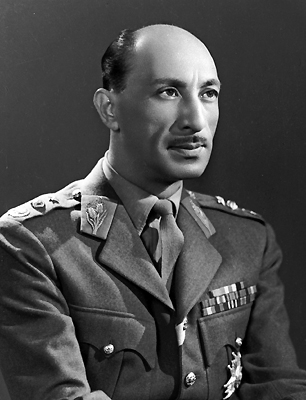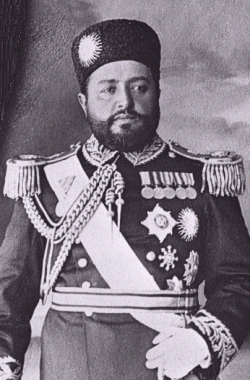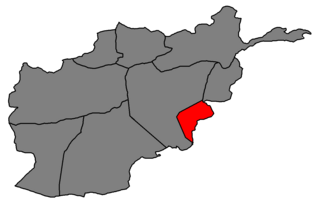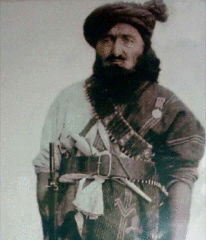Related Research Articles

Abdur Rahman Khan also known by his epithets,The Iron Amir,was Amir of Afghanistan from 1880 to his death in 1901. He is known for perpetrating the Hazara Genocide,but also uniting the country after years of internal fighting and negotiation of the Durand Line Agreement with British India.

European influence in Afghanistan has been present in the country since the Victorian era,when the competing imperial powers of Britain and Russia contested for control over Afghanistan as part of the Great Game.

Mohammad Zahir Shah was the last King of Afghanistan,reigning from 8 November 1933 until he was deposed on 17 July 1973. Ruling for 40 years,Zahir Shah was the longest-serving ruler of Afghanistan since the foundation of the Durrani Empire in the 18th century.

Dost Mohammad Khan Barakzai,nicknamed the Amir-i Kabir,was the founder of the Barakzai dynasty and one of the prominent rulers of Afghanistan during the First Anglo-Afghan War. With the decline of the Durrani dynasty,he became the Emir of Afghanistan in 1826. An ethnic Pashtun,he belonged to the Barakzai tribe. He was the 11th son of Payinda Khan,chief of the Barakzai Pashtuns,who was killed in 1799 by King Zaman Shah Durrani.

Khost is one of the 34 provinces of Afghanistan located in the southeastern part of the country. Khost consists of thirteen districts and the city of Khost serves as the capital of the province. Historically,Khost used to be a part of Paktia and a larger region surrounding Khost is still referred to as Loya Paktia.

The Second Anglo-Afghan War was a military conflict fought between the British Raj and the Emirate of Afghanistan from 1878 to 1880,when the latter was ruled by Sher Ali Khan of the Barakzai dynasty,the son of former Emir Dost Mohammad Khan. The war was part of the Great Game between the British and Russian empires.

Habibullah Khan was the Emir of Afghanistan from 1901 until his assassination in 1919. He was the eldest son of the Emir Abdur Rahman Khan,whom he succeeded by right of primogeniture in October 1901. His grandfather was Mohammad Afzal Khan.

Ghazi Amanullah Khan was the sovereign of Afghanistan from 1919,first as Emir and after 1926 as King,until his abdication in 1929. After the end of the Third Anglo-Afghan War in August 1919,Afghanistan was able to relinquish its protected state status to proclaim independence and pursue an independent foreign policy free from the influence of the United Kingdom.

Sir Henry Mortimer Durand,was a British diplomat and member of the Indian Civil Service. He is best-known as the namesake for the Durand Line,which serves as the international border between Afghanistan and Pakistan.
The following lists events that happened during 1913 in Afghanistan.
The following lists events that happened during 1925 in Afghanistan.

The name Afghānistān means "land of the Afghans",the name "Afghan" originally referred to a member of the Pashtuns. which originates from the ethnonym Afghan. Historically,Pashtuns were referred to as Afghans,the largest ethnic group of Afghanistan. The earliest reference to the name is found in the 10th-century geography book known as Hudud al-'Alam. The last part of the name,-stān is a Persian suffix for "place".

Mohammad Nadir Shah was King of Afghanistan from 15 October 1929 until his assassination in November 1933. He became the king after his victory in the Afghan Civil War of 1928–29. Previously,he served as Minister of War,Afghan Ambassador to France,and as a general in the Royal Afghan Army. He and his son Mohammad Zahir Shah,who succeeded him,are part of the Musahiban.

The Khost rebellion,also known as the 1924 Mangal uprising,the Khost revolt or the Mangal Revolt was an uprising against the Westernization and modernizing reforms of Afghanistan’s king,Amanullah Khan. The uprising was launched in Southern Province,Afghanistan,and lasted from March 1924 to January 1925. It was fought by the Mangal Pashtun tribe,later joined by the Sulaiman Khel,Ali Khel,Jaji,Jadran and Ahmadzai tribes. After causing the death of over 14,000 Afghans,the revolt was finally quelled in January 1925.

Bilateral relations of Afghanistan and the United Kingdom of Great Britain and Northern Ireland span a long and eventful history,dating back to the United Kingdom's Company rule in India,the British-Russian rivalry in Central Asia,and the border between modern Afghanistan and British India. There has been an Afghan embassy in London since 1922 though there was no accredited Afghan ambassador from 1981 to 2001.
The Khost rebellion was a rebellion in Khost that took place in 1912 in the Emirate of Afghanistan,and was the only serious crisis during the reign of Habibullah Khan.
Abd-al Karim (1897–1927) was an Afghan emir who ruled only in the Southern Province from July 1924 to January 1925.

The Afghan tribal revolts of 1944–1947 or the Khost disturbances were a series of tribal revolts in the Kingdom of Afghanistan by Zadran,Safi and Mangal tribesmen which lasted from February 1944 to January 1947. The causes of the revolts lay in the worsening conditions of farmers,changes in conscription laws,the elimination of the power of Safi tribal leaders,Amanullah loyalism,trading monopolies,government surveillance,taxation,and poverty. The conflict began when government forces clashed with the forces of a tribal leader named Mazrak,who led the Zadran tribe in revolt. The Zadran uprising was followed by additional uprisings by the Safi and Mangal,the former of which elected their own king,Salemai. Faqir of Ipi,a tribal leader from Waziristan,also fought for the restoration of former king Amanullah Khan alongside other rebels.

Amanullah loyalism was a series of early 20th century movements in the Kingdom of Afghanistan to restore Amanullah Khan as king of Afghanistan after he was deposed in January 1929 during the Afghan Civil War. Loyalists were sometimes referred to as Amanite. Loyalists tried to achieve this in various ways,including armed rebellions,political parties,colluding with foreign powers and assassinations. These movements petered out by the late 1940s. Amanullah died in exile in 1960 in Zürich,Switzerland,without ever regaining control,except a brief period of control in southern Afghanistan in the 1929 Afghan Civil War.

Babrak Khan was a Zadran chieftain who was the father of Said Akbar Babrak and of Mazrak Zadran.
References
- 1 2 3 Summary of the Administration of Lord Hardinge of Penhurst, November 1910 – March 1916. pp. 93, 94.
- 1 2 3 4 5 Hale, W. (1966). AFGHANISTAN, BRITAIN AND RUSSIA 1905 - 21. pp. 16, 17, 18.
- ↑ Chisholm, Hugh (1913). Britannica Year-book, 1913 -: A Survey of the World's Progress Since the Completion in 1910 of the Encyclopaedia Britannica. Encyclopaedia Britannica.**A wikilink to an article on [Afghanistan] in EB1922 is not available**
- ↑ Yapp, Malcolm; Preston, Paul; Partridge, Michael (1999). British documents on foreign affairs--reports and papers from the Foreign Office confidential print: From 1945 through 1950. Near and Middle East. University Publications of America. p. 33. ISBN 978-1-55655-765-1.